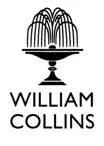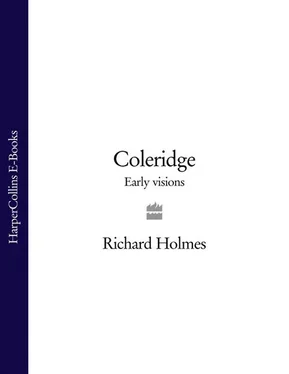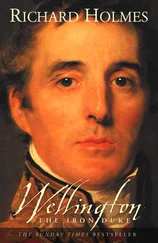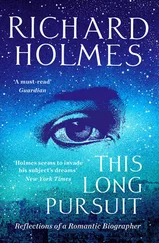Early Visions

Harper Perennial
An imprint of HarperCollins Publishers
77–85 Fulham Palace Road
Hammersmith
London W6 8JB
www.harpercollins.co.uk
This edition published by Harper Perennial 2005
First published in Great Britain by Hodder and Stoughton 1989
Copyright © Richard Holmes 1989
Richard Holmes asserts the moral right to be identified as the author of this work
A catalogue record for this book is available from the British Library
All rights reserved under International and Pan-American Copyright Conventions. By payment of the required fees, you have been granted the non-exclusive, non-transferable right to access and read the text of this e-book on-screen. No part of this text may be reproduced, transmitted, downloaded, decompiled, reverse engineered, or stored in or introduced into any information storage and retrieval system, in any form or by any means, whether electronic or mechanical, now known or hereinafter invented, without the express written permission of HarperCollins e-books.
HarperCollins Publishers has made every reasonable effort to ensure that any picture content and written content in this ebook has been included or removed in accordance with the contractual and technological constraints in operation at the time of publication.
Source ISBN: 9780007204571
Ebook Edition © JULY 2010 ISBN: 9780007378838
Version: 2014-09-15
To Vicki
Cover Page
Title Page
Copyright
Dedication
Preface
ONE Child Of Nature
TWO Orphan Of The Storm
THREE Prodigal Son
FOUR Pantisocrat
FIVE Watchman
SIX Prodigal Father
SEVEN Kubla Coleridge
EIGHT Mariner
NINE Der Wanderer
TEN Journeyman
ELEVEN Laker
TWELVE Lover
THIRTEEN Metaphysical Mountaineer
FOURTEEN Exile
Postscript
Keep Reading
Coleridge’s Circle
Bibliography And References
Bibliography
References
Reference Notes
Index
Acknowledgments
About the Author
Praise
Also By Richard Holmes
About the Publisher
Anyone who presumes to write about Coleridge runs the grave risk of sounding like the person on business from Porlock, a prosaic interrupter of marvels.
But some years ago, I suggested (anonymously) in The Oxford Companion to English Literature that Coleridge’s best work, “both poetry and prose, has the inescapable glow of the authentic visionary”. This biography has become my attempt to substantiate that wild claim, and to show what sort of visionary Coleridge really was, and why – among all the English Romantics – he is worth rediscovering today.
Wordsworth called him “the most wonderful man” he had ever known; but many subsequent biographers have been sceptical. It would seem possible to write an entire book on Coleridge’s opium addiction, his plagiarisms, his fecklessness in marriage, his political “apostasy”, his sexual fantasies, or his radiations of mystic humbug. And indeed, all these books have been written. 1But no biographer, since James Dykes Campbell in 1894, has tried to examine his entire life in a broad and sympathetic manner, and to ask the one vital question: what made Coleridge – for all his extravagant panoply of faults – such an extraordinary man, such an extraordinary mind?
The most radical thing about the present book – the first of two volumes – is simply that it is a defence of Coleridge in these terms. I have attempted to recapture his fascination as a man and a writer, and above all to make him live, move, talk, and “have his being”. If he does not leap out of these pages – brilliant, animated, endlessly provoking – and invade your imagination (as he has done mine), then I have failed to do him justice.
The present volume takes Coleridge to the age of thirty-one, the exact halfway point in his career, and his departure for Malta in 1804, the year before the Battle of Trafalgar. But it uses materials drawn from the second half of his life – notably his labyrinthine autobiography, the Biographia Literaria (written in Wiltshire in 1814–15), and his journalism in The Friend , a paper he wrote and edited in the Lake District in 1809–10. Coleridge, like many later nineteenth-century writers (Dickens, Hardy, Kipling) worked hard to reconstruct the truth of his early experiences and opinions, and this double vision, or duplicity, is an important theme from the start. It is partly for this reason that my second volume will be entitled: Darker Reflections.
In his first thirty years Coleridge wrote much of the poetry for which he is now remembered: “Kubla Khan”, The Rime of the Ancient Mariner , “Christabel”, “Frost at Midnight”, and “Dejection: an Ode”. Many of these have become part of the folklore of Romanticism, and entered proverbially into the language – “an albatross”, an “ancient mariner type”, a journey “to Xanadu”. But what is much less well-known, is that Coleridge went on rewriting, improving, and re-presenting them in later life (the most famous case being the preface to “Kubla Khan”, and the highly significant arrival of that person from Porlock), and I shall have more to say about their development in volume two. His play Osorio , which was written in 1798 but first performed as Remorse in 1812, will also receive further attention. Moreover there is much major – but neglected – poetry yet to come: “To William Wordsworth” (1807), “Constancy to an Ideal Object” (1805–25), or “The Garden of Boccaccio” (1828).
Contrary to legend, Coleridge remained a poet throughout his life, and his later work – the poetry of old age and failing vision – is some of the most moving and revealing. It is impossible to understand him without reference to such works as “A Tombless Epitaph” (1811), which re-explores the symbolic caverns of his youth, as already appears in this volume.
The sequence of autobiographical verse known as the Conversation Poems, which runs from 1794 to 1807, seems to me perhaps his finest poetic achievement (without which Wordsworth would never have developed The Prelude ). I have examined its themes closely in my narrative, suggesting that our notion of “Romanticism” itself partly grows out of them. Coleridge (and Wordsworth) used the word “Romantic” largely in a loose, eighteenth-century, topographical sense – that “deep Romantic chasm”, or even on one memorable occasion that “old Romantic goat” – to denote the visually wild and sublime (sometimes comically so). But they were equally conscious of using language experimentally, and creating a revolution in taste and sensibility. So I have also freely used the term with its modern, critical implications (disputed of course) to denote that new element of imaginative power and intensity of self-expression which we now associate with the period of political and cultural revolution throughout Europe between 1780 and 1830.
But Coleridge was much more than a Romantic poet: he was also a journalist of genius, a translator, a matchless letter-writer (six volumes), an incomparable autobiographer and self-interrogator in his Notebooks (over sixty surviving between 1794 and his death), a literary critic, a spectacular lecturer, a folklorist, a philosopher, a psychologist (specialising in dreams and creativity), a playwright and dramatic critic, and – that much disputed word – a metaphysician. He was also a travel-writer, a fell-walker, and amateur naturalist with an inspired eye for movement and transformation processes – cloud structures, plant growth, animal activity, light shifts, water changes, wind effects. All these aspects I have tried to bring alive, although Coleridge scholars will know what dreadful chasms (such as English and German Idealist philosophy) I have perilously skimmed over, in this first volume at any rate.
Читать дальше













